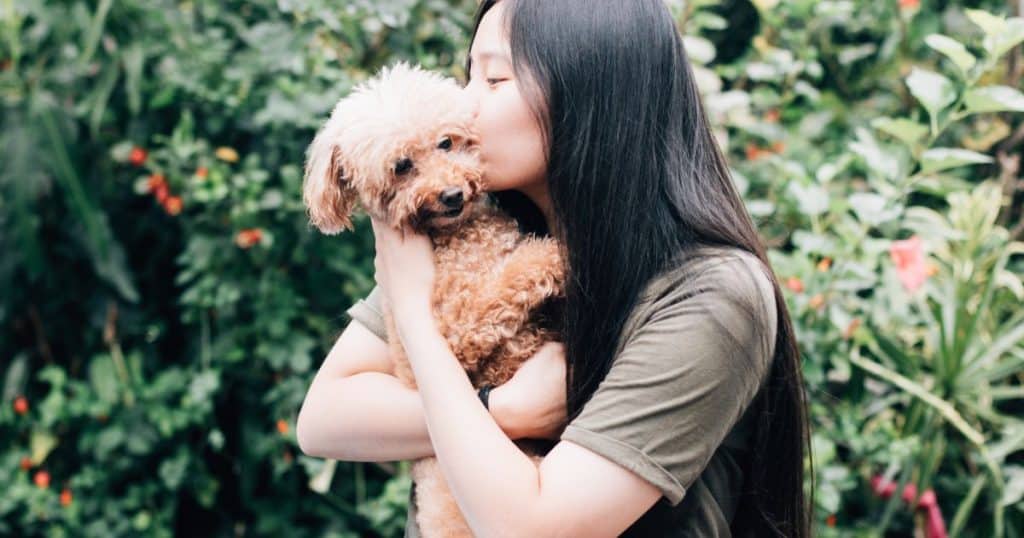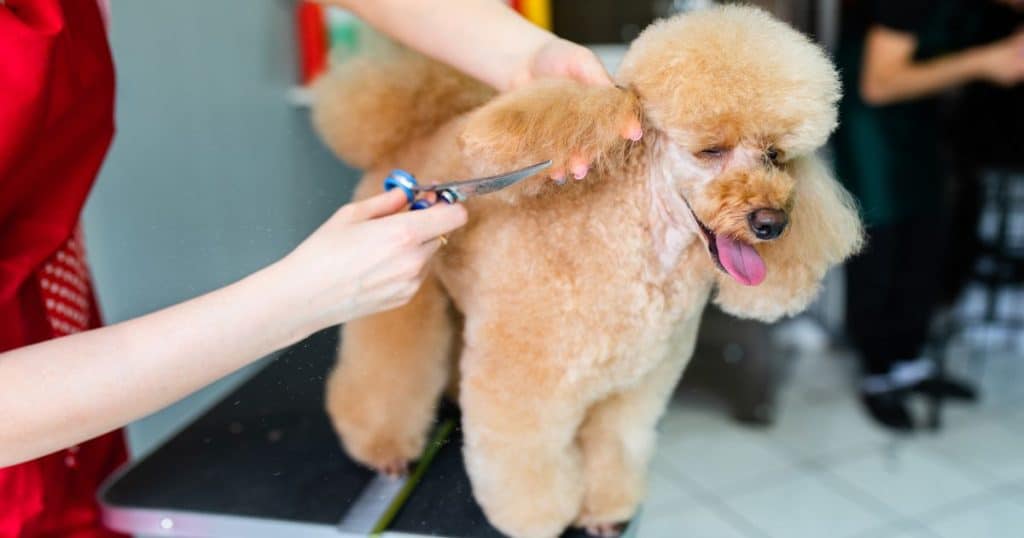Table of Contents
If you’re a poodle owner, you know how loving and loyal these dogs can be. However, just like humans, poodles can experience fear and stress. It’s important to recognize the signs of fear and stress in your poodle so that you can address the issue and help your furry friend feel more comfortable.
Understanding Poodle Fear and Stress is crucial for any poodle owner. Fear-related anxiety can be caused by loud noises, strange people or animals, new or strange environments, or specific situations like the vet’s office or grooming appointments. If your poodle is exhibiting signs of fear or stress, it’s important to identify the cause of their anxiety so that you can take steps to alleviate their discomfort.
Key Takeaways
- Poodles can experience fear and stress just like humans.
- Fear-related anxiety can be caused by loud noises, strange people or animals, new or strange environments, or specific situations like the vet’s office or grooming appointments.
- Identifying the cause of your poodle’s anxiety is crucial for alleviating their discomfort.
Understanding Poodle Fear and Stress

As a poodle owner, it’s important to understand that just like humans, dogs can experience fear and stress. Poodles, in particular, are a breed that can be prone to anxiety, so it’s essential to recognize the signs and know how to help your furry friend.
Fear and stress can be caused by a variety of factors, including loud noises, strange people or animals, visual stimuli like hats or umbrellas, and separation from their owners. It’s important to recognize the signs of fear and stress in your poodle, which may include trembling, excessive barking or whining, panting, hiding, aggression, or even destructive behavior.
One way to help your poodle manage their fear and stress is to create a safe and secure environment for them. This can include providing a cozy and comfortable space for them to retreat to when they feel anxious, such as a crate or a designated area in your home. Additionally, you can try playing calming music or using a pheromone diffuser to help them relax.
Another way to alleviate your poodle’s fear and stress is through exercise and mental stimulation. Regular exercise can help reduce anxiety and stress, as well as provide an outlet for excess energy. Mental stimulation, such as puzzle toys or training exercises, can also help keep your poodle’s mind engaged and reduce anxiety.
If your poodle’s fear and stress are severe or persistent, it’s important to seek the help of a veterinarian or a professional dog trainer. They may be able to recommend behavior modification techniques or medication to help manage your poodle’s anxiety.
Overall, understanding your poodle’s fear and stress is crucial for their well-being. By recognizing the signs and taking steps to alleviate their anxiety, you can help your furry friend live a happier and healthier life.
Common Triggers of Stress in Poodles

Poodles are known for their intelligence, loyalty, and friendly nature. However, like any other dog, they can experience fear and anxiety. There are several common triggers of stress in Poodles that owners should be aware of to help their furry friends feel more comfortable and relaxed.
Loud Noises
Loud noises such as fireworks, thunderstorms, and even vacuum cleaners can trigger fear and anxiety in Poodles. The sudden loud noise can startle them and cause them to feel threatened. Poodles may exhibit signs of stress such as shaking, panting, and hiding.
Strange People
Poodles are known to be friendly dogs, but they can also feel anxious around unfamiliar people. If your Poodle is not used to being around strangers, they may feel threatened and stressed. This can lead to barking, growling, and even aggression.
Separation Anxiety
Poodles are social animals and can suffer from separation anxiety when left alone for extended periods. They may exhibit signs of stress such as excessive barking, destructive behavior, and even self-harm.
Environmental Changes
Poodles can also experience stress when there are changes in their environment. Moving to a new home, a change in routine, or even a new pet in the household can cause stress and anxiety in Poodles. They may become withdrawn, lose their appetite, and even develop physical symptoms such as vomiting and diarrhea.
As a responsible Poodle owner, it’s important to recognize the common triggers of stress in your furry friend. By identifying these triggers, you can take steps to help your Poodle feel more comfortable and relaxed. This may include providing a safe and quiet space during loud noises, socializing your Poodle with unfamiliar people, and gradually introducing environmental changes to reduce stress and anxiety.
Signs of Fear and Stress in Poodles

As a responsible Poodle owner, it is essential to keep a close eye on your dog’s behavior to identify signs of fear and stress. Poodles are prone to anxiety, which can lead to destructive behavior and health issues if left untreated. In this section, we will discuss some common signs of fear and stress in Poodles.
Behavioral Signs
Panting, pacing, hiding, licking, whining, drooling, circling, shaking, and shedding are all common behavioral signs of fear and stress in Poodles. If your dog is exhibiting any of these behaviors, it is essential to identify the cause of their anxiety and take steps to alleviate their stress.
Physical Signs
Trembling, diarrhea, yawning, avoidance, escape behavior, dilated pupils, and tail tuck are all physical signs of fear and stress in Poodles. These signs can be indicative of a more severe underlying issue, so it is crucial to take your dog to the vet if you notice any of these symptoms.
Vocalization
Barking excessively can be a sign of fear and stress in Poodles. If your dog is barking more than usual, it is essential to identify the cause of their anxiety and take steps to alleviate their stress.
Body Language
Poodles can communicate their fear and stress through their body language. Dilated pupils, tail tucking, and avoidance are all signs that your dog is feeling anxious. If your Poodle is exhibiting any of these signs, it is essential to identify the cause of their anxiety and take steps to alleviate their stress.
In conclusion, identifying signs of fear and stress in Poodles is crucial to ensuring the well-being of your furry friend. By keeping a close eye on your dog’s behavior, you can identify signs of anxiety and take steps to alleviate their stress. Remember to consult with your vet if you notice any physical symptoms of anxiety in your Poodle.
Effects of Prolonged Stress on Poodles

Prolonged stress can have a significant impact on a Poodle’s physical and mental health. When a Poodle experiences stress for an extended period, it can lead to destructive and compulsive behavior, phobias, panic, and other behavior problems. These issues can cause significant distress to both the Poodle and their owner.
One of the most common effects of prolonged stress on Poodles is destructive behavior. When a Poodle is stressed, they may resort to chewing on furniture, shoes, and other household items. This behavior can be expensive to replace and can cause significant damage to your home.
Compulsive behavior is another common effect of prolonged stress on Poodles. Compulsive behaviors can include excessive licking, tail chasing, and paw biting. These behaviors can be harmful to the Poodle’s physical health and can lead to skin infections and other health issues.
Phobias and panic attacks are also common in Poodles who experience prolonged stress. These can be triggered by loud noises, such as thunderstorms and fireworks, or by being left alone for extended periods. These phobias and panic attacks can cause the Poodle to become anxious and fearful, which can lead to further behavior problems.
Prolonged stress can also lead to health issues in Poodles. Chronic stress can weaken the immune system, making the Poodle more susceptible to illnesses and infections. It can also lead to digestive issues, such as diarrhea and vomiting.
In conclusion, prolonged stress can have a significant impact on a Poodle’s physical and mental health. It can lead to destructive and compulsive behavior, phobias, panic, and other behavior problems. If you notice any of these signs in your Poodle, it’s essential to seek help from a veterinarian or a professional dog trainer. With the right treatment and care, you can help your Poodle overcome their stress and live a happy, healthy life.
Dealing with Separation Anxiety in Poodles

Separation anxiety is a common issue that many poodle owners face. It can be distressing for both the dog and the owner. However, there are several ways to alleviate separation anxiety in poodles.
Training is the most effective way to help your poodle overcome separation anxiety. Consistency is key, so it’s important to establish a routine and stick to it. Start by leaving your poodle alone for short periods of time, gradually increasing the duration as they become more comfortable. Positive reinforcement can also be helpful. Reward your poodle with treats and praise when they remain calm and relaxed while you’re away.
Providing your poodle with toys and other forms of entertainment can also help alleviate separation anxiety. Puzzle toys and chew toys can keep your poodle occupied and distracted while you’re away.
In addition to training and toys, it’s important to create a comfortable and safe environment for your poodle. Make sure they have access to food, water, and a comfortable place to rest. Consider leaving an article of clothing with your scent on it to provide comfort and familiarity while you’re away.
It’s important to remember that separation anxiety can be a complex issue and may require professional intervention. If your poodle’s anxiety persists despite your efforts, consult with a veterinarian or animal behaviorist for further guidance.
Overall, separation anxiety can be a challenging issue for poodle owners, but with patience and consistency, it can be overcome. By providing your poodle with a comfortable environment, engaging toys, and positive reinforcement, you can help them feel more secure and at ease while you’re away.
The Role of Exercise and Socialization

When it comes to managing fear and stress in Poodles, exercise and socialization play a crucial role. Regular exercise is essential for maintaining physical and mental health, and it can help reduce anxiety and stress in dogs. Poodles are a high-energy breed, so they require daily exercise to burn off excess energy and stay healthy.
One way to provide exercise for your Poodle is by taking them to a dog park. Dog parks provide a safe and controlled environment for your dog to run, play, and socialize with other dogs. Socialization is also important for reducing fear and anxiety in Poodles. By exposing your dog to different people, animals, and environments, you can help them build confidence and reduce their fear of new experiences.
It’s essential to introduce your Poodle to new experiences gradually and positively. For example, if your dog is afraid of loud noises, you can gradually expose them to the sound of thunder or fireworks by playing recordings at a low volume and gradually increasing the volume over time. You can also use positive reinforcement techniques such as treats and praise to help your dog associate new experiences with positive outcomes.
In addition to exercise and socialization, it’s also important to provide your Poodle with mental stimulation. Poodles are an intelligent breed, and they require mental stimulation to prevent boredom and reduce stress. Activities such as puzzle toys, obedience training, and agility training can provide mental stimulation and help your dog stay mentally sharp.
Overall, exercise and socialization are essential for managing fear and stress in Poodles. By providing your dog with regular exercise, socialization, and mental stimulation, you can help them stay healthy, happy, and confident.
Understanding Poodle Body Language

As a Poodle owner, it is essential to understand your furry friend’s body language to ensure they are feeling safe and comfortable. Poodles communicate through subtle cues, and understanding these cues can help you identify when your dog is feeling fearful or stressed.
Ears
Poodle ears are a good indicator of their mood. When a Poodle is relaxed and comfortable, their ears will be in their natural position. However, when they are feeling fearful or stressed, their ears may be flattened against their head. If your Poodle’s ears are back, it may be a sign that they are feeling anxious or threatened.
Body Language
Poodle body language can also provide insight into their emotional state. When a Poodle is feeling confident and comfortable, they will stand tall with their head held high. On the other hand, if they are feeling fearful or stressed, they may cower or try to make themselves appear smaller.
Tail
A Poodle’s tail can also be a good indicator of their mood. When a Poodle is happy and relaxed, their tail will be wagging gently. However, if they are feeling fearful or stressed, their tail may be tucked between their legs or held low.
Eyes
A Poodle’s eyes can also provide insight into their emotional state. When a Poodle is feeling comfortable and relaxed, their eyes will be soft and relaxed. However, if they are feeling fearful or stressed, their eyes may be wide open, with the whites of their eyes visible.
Flick
One final cue to look for is a Poodle’s flick. When a Poodle is feeling anxious or stressed, they may flick their tongue in and out of their mouth rapidly. This behavior is a sign of stress and can indicate that your Poodle is feeling overwhelmed.
Understanding your Poodle’s body language is essential to ensure they are feeling safe and comfortable. By paying attention to their cues, you can identify when your Poodle is feeling fearful or stressed and take steps to help them feel more comfortable.
How to Calm a Stressed Poodle

Poodles are intelligent, sensitive, and loving dogs. However, they can experience fear and stress just like any other dog. It is important to recognize the signs of stress in your poodle, such as trembling, excessive barking or whining, panting, hiding, aggression, or even destructive behavior. Once you recognize these signs, it is time to take action and help your furry friend calm down.
One way to calm a stressed poodle is to create a calm environment. You can do this by providing a comfortable and quiet space for your poodle to relax in. You can also use calming sprays or diffusers that release pheromones that can help your poodle feel more relaxed and confident. These products can be found at your local pet store or online.
Another way to calm a stressed poodle is to provide them with plenty of exercise and mental stimulation. Poodles are active dogs that need daily exercise to stay healthy and happy. You can take your poodle for a walk, play fetch, or engage in other activities that they enjoy. Mental stimulation, such as puzzle toys or training sessions, can also help your poodle focus and relax.
If your poodle is still stressed, you can try using calming supplements or medications. These can be prescribed by your veterinarian and can help your poodle feel more relaxed and calm. However, it is important to consult with your veterinarian before giving your poodle any supplements or medications.
In conclusion, there are many ways to calm a stressed poodle, including creating a calm environment, providing exercise and mental stimulation, and using calming supplements or medications. By recognizing the signs of stress in your poodle and taking action to help them calm down, you can ensure that your furry friend stays happy and healthy.
Training Strategies for Fear and Stress

Training your Poodle can be an effective way to help them cope with fear and stress. A professional dog trainer can help you develop strategies to counter-condition your Poodle, which involves replacing their negative associations with positive ones.
One strategy is to use desensitization, which involves gradually exposing your Poodle to the object or situation that causes their fear or stress. This can be done by starting with a low level of exposure and gradually increasing it over time. It’s important to reward your Poodle for calm behavior during this process.
Counterconditioning is another effective strategy, which involves associating the object or situation that causes fear or stress with something positive, such as treats or playtime. This can help your Poodle develop a positive association with the trigger.
In addition to these strategies, it’s important to provide your Poodle with plenty of exercise and mental stimulation. This can help them release pent-up energy and reduce stress. Regular grooming can also help your Poodle feel more relaxed and comfortable.
Consistency is key when training your Poodle. It’s important to stick to a routine and provide positive reinforcement for calm behavior. With patience and persistence, you can help your Poodle overcome their fear and stress and lead a happy, healthy life.
Role of Medications in Managing Stress

If your Poodle is experiencing fear and stress, it may be time to consider medication as part of their treatment plan. Medications can be prescribed by a veterinarian and are often used in conjunction with behavior modification techniques to help manage stress and anxiety.
One type of medication that may be prescribed is anti-anxiety medication. These medications can help reduce anxiety and promote relaxation. Some commonly prescribed anti-anxiety medications for dogs include benzodiazepines (such as alprazolam), tricyclic antidepressants (such as clomipramine), and selective serotonin reuptake inhibitors (such as fluoxetine).
It is important to note that medications are not a cure-all solution and should always be used in conjunction with behavior modification techniques. Additionally, medications should only be given under the guidance of a veterinarian. Dosages may need to be adjusted over time, and some medications can have potential side effects.
When considering medications for your Poodle, it is important to discuss the potential benefits and risks with your veterinarian. They can help determine which medication is best suited for your Poodle’s specific needs and monitor their progress over time.
In addition to medications, there are other ways to help manage your Poodle’s stress and anxiety. This can include creating a low-stress environment, using calming aids such as pheromone sprays or calming music, and providing plenty of exercise and mental stimulation.
Overall, medications can play an important role in managing stress and anxiety in Poodles. However, they should always be used in conjunction with behavior modification techniques and under the guidance of a veterinarian. With the right treatment plan, your Poodle can live a happy, healthy, and stress-free life.
Consulting a Veterinary Behaviorist

If you are concerned about your Poodle’s fear and stress, you should consider consulting a veterinary behaviorist. These professionals are experts in animal behavior and can help diagnose and treat a wide range of behavior problems. They can also provide guidance on how to prevent future issues from arising.
Behavior problems in dogs can be caused by a variety of factors, including genetics, environment, and past experiences. A veterinary behaviorist can help identify the root cause of your Poodle’s fear and stress and develop a customized treatment plan to address it.
During your consultation, the veterinary behaviorist will likely ask you questions about your Poodle’s behavior, medical history, and environment. They may also observe your Poodle’s behavior and perform a physical examination to rule out any underlying medical conditions.
Based on their assessment, the veterinary behaviorist may recommend a variety of treatments, including behavior modification, medication, and environmental changes. They may also provide you with training and guidance on how to manage your Poodle’s behavior at home.
It’s important to note that consulting a veterinary behaviorist can be expensive, and treatment may take time to see results. However, investing in your Poodle’s behavior and health can lead to a happier and more fulfilling life for both you and your furry friend.
In addition to consulting a veterinary behaviorist, there are also other resources available to help you manage your Poodle’s fear and stress. These may include online forums, support groups, and training classes. With the right support and guidance, you can help your Poodle overcome their fears and live a happy, healthy life.
Understanding Poodle Breed Specifics

Poodles are a highly intelligent breed of dog, known for their regal appearance and posh demeanor. They come in three different sizes: standard, miniature, and toy. Each size has its own unique characteristics, but all poodles share a few common traits.
One of the most notable features of poodles is their intelligence. They are ranked as the second most intelligent breed of dog, just behind the Border Collie. This means that they are quick learners and can be easily trained to perform a variety of tasks.
In addition to their intelligence, poodles are also known for their temperament. They are typically friendly, loyal, and affectionate towards their owners. However, they can be wary of strangers and may take some time to warm up to new people.
When it comes to stress and anxiety, poodles are not immune. They can experience separation anxiety, fear-related behaviors, and other anxiety-related issues. It is important for owners to recognize the signs of stress in their poodles and take steps to address the underlying issues.
Overall, poodles are a unique and beloved breed of dog. Their intelligence and temperament make them great companions, but it is important for owners to understand their breed-specific characteristics in order to provide the best care possible.
Genetics and Fear Responses in Poodles

Poodles are known for their intelligence, elegance, and hypoallergenic coats. However, like all dogs, they are susceptible to fear and stress. While environmental factors such as traumatic experiences and lack of socialization can contribute to fear and stress, genetics also play a significant role in how poodles respond to fear-inducing stimuli.
Studies have shown that poodles, like other dog breeds, can inherit abnormal reactions to certain stimuli due to genetic factors. For example, a genetic study of fear of fireworks and other loud noises in standard poodles found that fear of fireworks had a genomic heritability of 28% and noise reactivity had a genomic heritability of 15% [1]. This suggests that certain poodles may be predisposed to fear and stress responses to loud noises due to their genetic makeup.
The autonomic nervous system (ANS) is responsible for regulating the body’s response to stress and fear. The ANS is composed of two branches: the sympathetic nervous system (SNS) and the parasympathetic nervous system (PNS). The SNS triggers the “fight or flight” response, while the PNS promotes relaxation and rest. Studies have shown that genetic variations in ANS-related genes can affect how dogs respond to stress and fear [2].
In summary, genetics play a significant role in how poodles respond to fear-inducing stimuli. Poodles can inherit abnormal reactions to certain stimuli due to genetic factors, and genetic variations in ANS-related genes can affect how dogs respond to stress and fear. Understanding the genetic basis of fear and stress responses in poodles can help breeders and owners identify and manage dogs that are predisposed to these issues.
[1] https://cgejournal.biomedcentral.com/articles/10.1186/s40575-023-00125-0
[2] https://www.ncbi.nlm.nih.gov/pmc/articles/PMC9996964/
Aging, Memory, and Learning in Poodles

As poodles age, they may experience changes in their cognitive function, memory, and learning abilities. The aging process can cause a decline in cognitive function, which can lead to behavioral changes and anxiety in dogs.
Senior poodles may experience cognitive dysfunction, which is similar to Alzheimer’s in humans. This condition can cause confusion, disorientation, and memory loss in dogs. According to the ASPCA, some of the signs of cognitive dysfunction in senior dogs include getting lost in familiar locations, going to the wrong side of the door, and getting stuck and unable to navigate around obstacles.
Memory and learning abilities can also be affected by aging in poodles. Older poodles may have a harder time learning new commands or retaining information. This can be frustrating for both the dog and the owner, but it is important to be patient and consistent with training.
White poodles may also be at risk for developing deafness as they age. Deafness can make it harder for older poodles to respond to commands and interact with their environment. It is important to be aware of any changes in your poodle’s hearing and to adjust your training and communication accordingly.
Overall, it is important to be aware of the changes that aging can bring to your poodle’s cognitive function, memory, and learning abilities. By being patient, consistent, and understanding, you can help your senior poodle continue to live a happy and healthy life.
Addressing Excessive Barking in Poodles
Excessive barking in poodles can be a sign of fear or stress. It is important to identify the cause of the barking and address it appropriately.
Here are some tips on how to remove or handle excessive barking in poodles:
- Identify the trigger: The first step in addressing excessive barking is to identify the trigger. Observe your poodle closely to determine what situations or stimuli provoke their barking, such as encountering other dogs, strangers approaching, or loud noises. Once you have identified the trigger, you can take steps to remove or handle it.
- Training: Training is an effective way to reduce excessive barking in poodles. Positive reinforcement techniques can be used to teach your poodle to stop barking on command. You can also train your poodle to be less reactive to certain triggers by gradually exposing them to the trigger in a controlled environment.
- Environment: Creating a calm and stress-free environment for your poodle can also help reduce excessive barking. Provide your poodle with a comfortable and secure space where they can retreat when they feel stressed or anxious. Avoid exposing your poodle to situations or stimuli that trigger excessive barking.
- Professional help: If your poodle’s excessive barking is caused by fear or anxiety, it may be helpful to seek professional help from a certified dog behaviorist or trainer. They can provide you with personalized advice and training plans to address your poodle’s specific needs.
It is important to remember that excessive barking in poodles can be a sign of underlying fear or stress. By identifying the trigger, providing a calm environment, and using positive reinforcement techniques, you can help your poodle feel more secure and reduce their excessive barking.
Grooming and Stress in Poodles

Grooming is an essential part of a Poodle’s life. However, it can also be a significant source of stress for them. Poodles are known for their high-maintenance coats, which require frequent grooming. The grooming process can be stressful for many reasons, such as the use of loud grooming tools, the presence of strangers, or the feeling of being restrained.
As a Poodle owner, it’s essential to understand the signs of stress in your dog during grooming sessions. These signs can include panting, shaking, whining, or growling. If you notice any of these signs, it’s crucial to take steps to reduce your Poodle’s stress levels during grooming.
One way to reduce stress during grooming is to make it a positive experience. You can do this by offering treats or praise during the grooming session. This can help your Poodle associate grooming with positive experiences, reducing their stress levels over time.
Another way to reduce stress during grooming is to desensitize your Poodle to the grooming tools and process. This can be done by gradually introducing your Poodle to the tools and process over time. Start with short grooming sessions and gradually increase the length of the sessions as your Poodle becomes more comfortable.
It’s also essential to ensure that your Poodle is comfortable during grooming. This means providing a comfortable and secure grooming area and using gentle grooming tools. You can also use calming aids such as hemp oil or lavender to help your Poodle relax during grooming.
In summary, grooming can be a significant source of stress for Poodles. As a Poodle owner, it’s essential to understand the signs of stress and take steps to reduce your Poodle’s stress levels during grooming. By making grooming a positive experience, desensitizing your Poodle to the grooming tools and process, and ensuring their comfort during grooming, you can help reduce your Poodle’s stress levels and make grooming a more enjoyable experience for both you and your Poodle.
Therapy and Other Stress Management Techniques

If your Poodle is experiencing fear and stress, there are various therapy and stress management techniques that you can explore to help them cope. Here are some of the most effective methods:
Therapy
One of the most effective ways to manage your Poodle’s fear and stress is through therapy. This can include cognitive-behavioral therapy, which helps your Poodle change their negative thought patterns, and exposure therapy, which gradually exposes your Poodle to their fears in a controlled environment. It is important to seek the help of a professional trainer or therapist who has experience with fear and stress management in dogs.
Strategies
There are also various strategies that you can use to help your Poodle manage their fear and stress. One of the most effective strategies is to create a safe and comfortable environment for your Poodle. This can include providing them with a cozy bed, a quiet space to retreat to, and plenty of toys and treats to keep them occupied.
Another effective strategy is to use positive reinforcement training to help your Poodle feel more confident and secure. This can include rewarding them for good behavior, teaching them new tricks, and providing them with plenty of love and attention.
Children
If you have children in your home, it is important to teach them how to interact with your Poodle in a safe and respectful manner. This can include teaching them how to approach your Poodle, how to pet them gently, and how to recognize signs of fear and stress in your Poodle. It is also important to supervise any interactions between your Poodle and children to ensure that they are safe and positive for everyone involved.
By utilizing these therapy and stress management techniques, you can help your Poodle overcome their fear and stress and lead a happy and healthy life. Remember to always seek the help of a professional trainer or therapist if you need additional support.
FAQs
What are some common signs of stress in Poodles?
Poodles, like all dogs, can experience stress in response to various stimuli. Some common signs of stress in Poodles include shaking, panting, drooling, pacing, and whining. They may also exhibit destructive behavior, such as chewing or digging, or become aggressive or withdrawn. If you notice any of these signs in your Poodle, it’s important to identify the cause of their stress and take steps to reduce it.
What are some effective ways to reduce stress in Poodles?
There are several effective ways to reduce stress in Poodles. One common method is to desensitize them to the cause of their fear or anxiety. For example, if your Poodle is afraid of loud noises, you can gradually expose them to the sound at a low volume and gradually increase it over time. Another method is to provide a safe space for your Poodle, such as a crate or a designated room, where they can retreat when they feel stressed. Regular exercise and playtime can also help reduce stress in Poodles.
Are there any supplements or medications that can help with Poodle anxiety?
There are several supplements and medications that can help with Poodle anxiety, but it’s important to consult with a veterinarian before giving your Poodle any medication or supplement. Some common supplements that can help reduce anxiety in Poodles include chamomile, valerian root, and melatonin. Prescription medications, such as fluoxetine or clomipramine, may also be prescribed by a veterinarian in severe cases.
What are some common triggers of fear in Poodles?
Poodles can experience fear in response to various stimuli, such as loud noises, unfamiliar people or animals, or specific objects or situations. Separation anxiety is also a common cause of fear in Poodles, which can be triggered when their owner leaves the house. Identifying the cause of your Poodle’s fear is important in order to take steps to reduce their anxiety.
How can I help my Poodle feel more comfortable when left alone?
There are several ways to help your Poodle feel more comfortable when left alone. One method is to gradually increase the amount of time they spend alone, starting with just a few minutes and gradually increasing the time over several weeks. Providing a safe space, such as a crate or designated room, can also help your Poodle feel more secure when left alone. Leaving them with a special toy or treat can also help distract them and reduce anxiety.
What are some training techniques to help Poodles overcome their fears?
There are several training techniques that can help Poodles overcome their fears, such as counter-conditioning and desensitization. Counter-conditioning involves associating the cause of their fear with a positive experience, such as giving them treats or praise when they are exposed to the trigger. Desensitization involves gradually exposing your Poodle to the cause of their fear at a low level and gradually increasing it over time. It’s important to work with a professional dog trainer or behaviorist to develop an effective training plan for your Poodle.
In conclusion, Poodle Fear and Stress can be effectively managed with proper care and attention. By identifying the cause of their anxiety and implementing effective training techniques and stress-reducing methods, you can help your Poodle feel more comfortable and secure. Remember to always consult with a veterinarian or professional dog trainer before giving your Poodle any medication or supplement.




Leave a Reply
You must be logged in to post a comment.